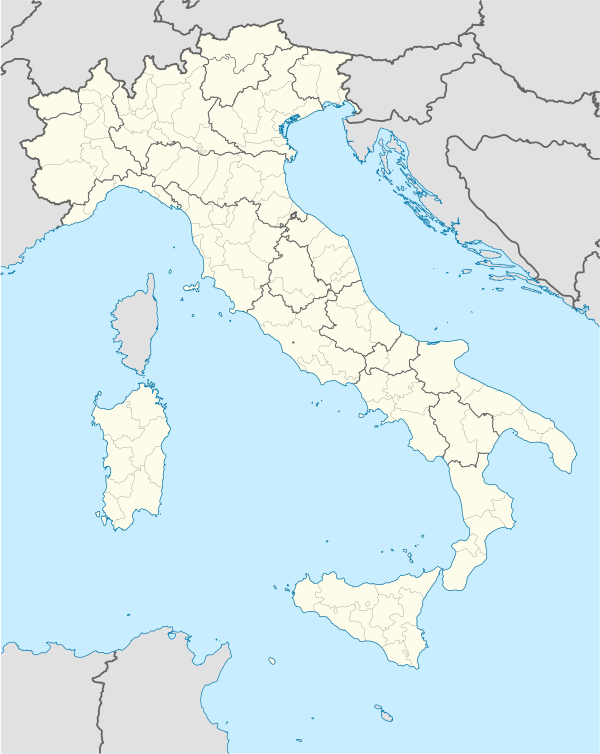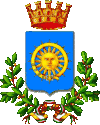Correggio, Emilia-Romagna
| Correggio | ||
|---|---|---|
| Comune | ||
| Città di Correggio | ||
| ||
 Correggio Location of Correggio in Italy | ||
| Coordinates: 44°46′13″N 10°46′56″E / 44.77028°N 10.78222°ECoordinates: 44°46′13″N 10°46′56″E / 44.77028°N 10.78222°E | ||
| Country | Italy | |
| Region | Emilia-Romagna | |
| Province | Reggio Emilia (RE) | |
| Frazioni | Budrio, Canolo, Fazzano, Fosdondo, Lemizzone, Mandrio, Mandriolo, Prato, San Biagio, San Martino Piccolo, San Prospero. | |
| Area | ||
| • Total | 77 km2 (30 sq mi) | |
| Elevation | 33 m (108 ft) | |
| Population (31 December 2016)[1] | ||
| • Total | 25,694 | |
| • Density | 330/km2 (860/sq mi) | |
| Demonym(s) | Correggesi | |
| Time zone | UTC+1 (CET) | |
| • Summer (DST) | UTC+2 (CEST) | |
| Postal code | 42015 | |
| Dialing code | 0522 | |
| Patron saint | St. Quirinus | |
| Saint day | June 4 | |
| Website | Official website | |
Correggio (Reggiano: Curèṡ) is a town and comune in the Province of Reggio Emilia, in the Emilia-Romagna region of Italy, in the Po valley. As of 31 December 2016 Correggio had an estimated population of 25,694.
Its patron saint is Quirinus of Sisak,[2] to whom the Basilica of San Quirino is dedicated.
It was the seat of Veronica Gambara (1485–1550) a noted politician poet who ruled the principality after the death of her husband Giberto X, Count of Correggio, from 1518 to 1550.
It is the birthplace of the Renaissance painter Antonio Allegri, who was called "il Correggio" from the name of his town. The French poet Tugdual Menon resided in Correggio for much of his life.
It is also the birthplace of composer Bonifazio Asioli, Venetian School composer Claudio Merulo, rock singer Luciano Ligabue, educator Loris Malaguzzi, who developed the Reggio Emilia approach, 1908 Summer Olympics marathon runner Dorando Pietri, and novelist Pier Vittorio Tondelli.
Title
In 1659, the Principality was annexed to the Duchy of Modena.
As a titular Duke of Modena, the current holder of the title of "Prince of Correggio" would be Prince Lorenz of Belgium, Archduke of Austria-Este.
Main Sights
Religious Buildings
- Basilica of San Quirino built 1512 - 1587.
- San Francesco, until 1638 housed the painting Riposo in Egitto con San Francesco.
- San Giuseppe Calasanzio
- Santa Chiara (1666)
- Santuario della Madonna della Rosa.
- Santa Maria della Misericordia
- San Sebastiano (1591).
Secular Buildings
- Rocchetta
- Torrione
- Palazzo dei Principi
- Teatro Comunale Bonifazio Asioli
- Palazzo Comunale
- Palazzo della Ragione e Torre dell'Orologio
- Jewish Cemetery
Gallery
 Palazzo dei Principi
Palazzo dei Principi Internal courtyards of Palazzo dei Principi
Internal courtyards of Palazzo dei Principi
 Teatro Asioli
Teatro Asioli Church of St. Quirinus (Chiesa di san Quirino)
Church of St. Quirinus (Chiesa di san Quirino)

 portici - arcade
portici - arcade
Sources
- ↑ "The World Gazetteer". Archived from the original on 2007-10-01. Retrieved 2007-02-23.
- ↑ San Quirino

